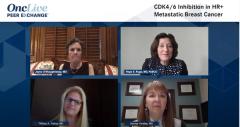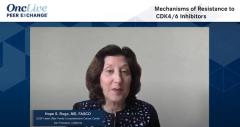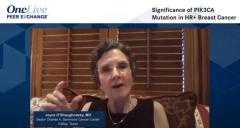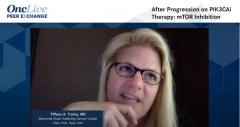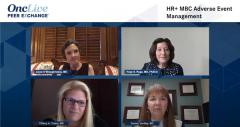
CDK4/6 Inhibition in HR+ Metastatic Breast Cancer
Episodes in this series

Joyce O’Shaughnessy, MD: Now let's move onto metastatic breast cancer, hormone receptor positive, HER2 negative. We'll turn to Denise because Denise had some interesting data from the MONALESSA-3 and 7 trials at ASCO [the American Society of Clinical Oncology annual meeting], which I'd like to hear her summarize. In the context of what's going on, are we getting some survival advantages with the CDK4/6 [cyclin-dependent kinases 4 and 6] inhibitors?
Denise Yardley, MD: Thanks Joyce. It continues to be such an exciting time in hormone receptor-positive metastatic breast cancer again. It's been such a welcomed addition of the CDK 4/6 inhibitors in first-, second-, and later-line settings in the hormone receptor-positive patients. We were all excited when we had the initial look at the data from the PALOMA trial back in 2015, and then in 2017 we saw 3 CDK4/6 inhibitors get FDA approval.
I think we've learned how to embrace them in the practice. They have become a standard of care in the first-line setting for the hormone receptor-positive patients. I think when we look at the data from palbociclib, ribociclib, and abemaciclib, we continue to try to look at subgroups in the hormone receptor-positive patients, looking at patients with visceral disease, time of relapse, and what their prior adjuvant therapy consists of.
I think we see that exciting, resonating message of the efficacy of the CDK4/6 inhibitors. We have a challenge of trying to figure out who does not benefit from a CDK4/6 inhibitor in the hormone receptor-positive patients. We have our first-line trials. I think the MONALESSA-7 was an exciting trial, a bit unique in that it really tried to carve-out those premenopausal, perimenopausal patients who had participated in the other CDK4/6 study, but that was a dedicated trial. With that we see the issue in these premenopausal patients of a more aggressive biology. It was a different patient population in the sense of the key entry criteria for those patients.
That trial also looked at tamoxifen in combination with ribociclib, and due to an interaction, that arm was closed. So tamoxifen is not seen in combination with ribociclib. But the nonsteroidal aromatase inhibitors [AIs] have combined nicely with all 3 of the CDK4/6 inhibitors. What we've now tried to look at, and some of the data that I was able to present at ASCO, is that when we see this resounding message for ribociclib and abemaciclib of this overall survival and median progression-free survival advantage, we've looked at some of the hormone receptor positive-patients who present with visceral metastasis.
Are they different from our bone only or soft tissue presentations? I think traditionally that's been a presentation that I know many of my partners with a hormone receptor-positive patient who has had a metastasis in the liver or lung have shied away from an endocrine approach and really thought about chemotherapy for those showing disease in such a life-threatening organ.
The data that I was able to present are looking at both the MONALEESA-3, which was the 2:1 randomization of ribociclib with fulvestrant, and then the MONALEESA-7 with the premenopausal and perimenopausal group, looking at it in combination with an AI. The data looked at carving out those patients who presented with either visceral metastasis, specifically lung and liver, which was about 60% of those patients, and seeing how did they fare. Did they fare as well as patients in the overall population who gained a median progression-free and overall survival advantage?
I think the resounding message was the efficacy of the CDK4/6 inhibitors in combination with endocrine therapy in these presentations with perhaps considered more life-threatening disease in liver and lung, and showed a survival advantage and median progression-free survival advantage for those populations as well, at no increased toxicity. Sometimes we look at the liver in terms of being able to metabolize, or looking at the issues with a bump in the liver function test as a consequence of the CDK4/6 inhibitor.
None of that was exasperated in that patient population. I think there’s a lot of comfort now in not pulling a trigger for cytotoxic chemotherapy in the absence of a patient presenting with visceral crisis. Being able to look at a presentation with liver metastasis, lung metastasis, or both, and seeing that they too achieve a 20% and 30% reduction in the risk of death of starting out with an endocrine therapy in combination with ribociclib for their presentation of hormone receptor-positive metastatic breast cancer.
I know that gives us more confidence that, as we've seen with the overall population, when we really dissect into these subgroups of not just bone-only disease, but visceral metastases, we're seeing that same resounding message of efficacy in those subgroups. I think that gives us a lot of confidence of the role of the cell cycle inhibitors in combination with endocrine therapy as remaining the standard of care, no matter what those presentations are outside of the visceral crisis.
Joyce O’Shaughnessy, MD: Super, that’s so important, it's really paradigm changing. You've got survival data for the worst of these patients, unless like you said, they’re a total visceral crisis, which is uncommon. Otherwise, their survival is positively impacted by CDK4/6 inhibitors, through MONALEESA-7 and 3, ribociclib. We should be using much less chemotherapy in the first-line setting. On survival, it is emerging with these CDK4/6 inhibitor trials, and we have 2 endocrine agents, fulvestrant, an aromatase inhibitor in the first-line setting.
Transcript edited for clarity.




